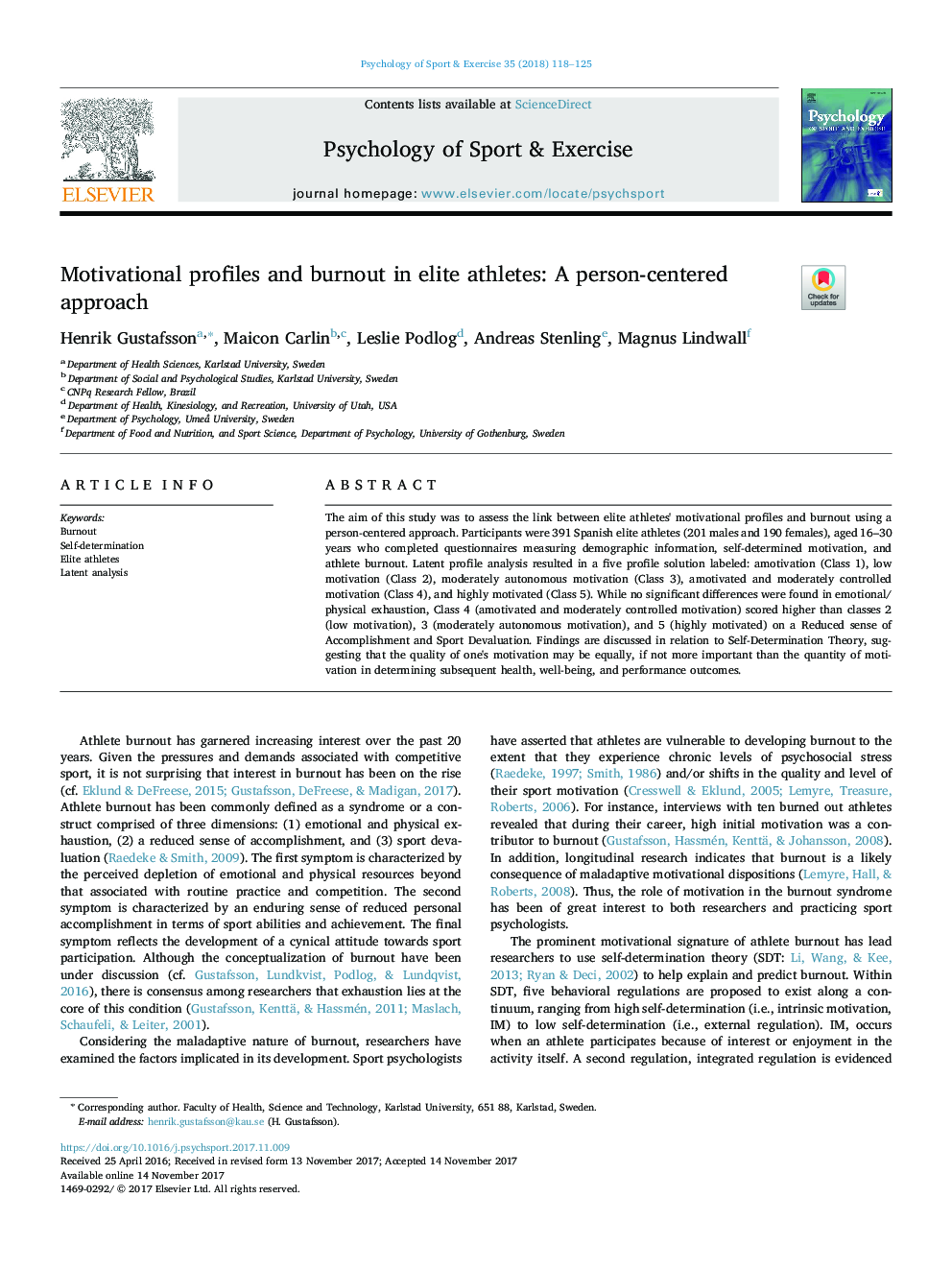| کد مقاله | کد نشریه | سال انتشار | مقاله انگلیسی | نسخه تمام متن |
|---|---|---|---|---|
| 7253093 | 1472092 | 2018 | 8 صفحه PDF | دانلود رایگان |
عنوان انگلیسی مقاله ISI
Motivational profiles and burnout in elite athletes: A person-centered approach
ترجمه فارسی عنوان
پروفایل های انگیزشی و فرسودگی شغلی در ورزشکاران نخبه: یک رویکرد شخصیت محور
دانلود مقاله + سفارش ترجمه
دانلود مقاله ISI انگلیسی
رایگان برای ایرانیان
کلمات کلیدی
سوختن، تعیین خود، ورزشکاران نخبه، تجزیه و تحلیل غیر منتظره،
ترجمه چکیده
هدف از این مطالعه بررسی رابطه میان انگیزه های نخبگان ورزشکاران و فرسودگی شغلی با استفاده از رویکرد شخص محور است. شرکت کنندگان 391 ورزشکار نخبه اسپانیایی (201 مرد و 190 زن) در سن 16 تا 30 سال بودند که پرسشنامه هایی را برای سنجش اطلاعات جمعیتی، انگیزه خودتنظیم و فرسودگی ورزشکار تکمیل کردند. تجزیه و تحلیل مشخصات ناگهانی منجر به یک راه حل پنج علامت: آموختن (کلاس 1)، انگیزه کم (کلاس 2)، انگیزه نسبتا مستقل (کلاس 3)، انگیزه متمرکز و متوسط کنترل (کلاس 4) و بسیار انگیزه (کلاس 5). در حالی که در میزان خستگی احساسی / فیزیکی اختلاف معنی داری وجود نداشت، کلاس 4 (انگیزه با انگیزه و انگیزه نسبتا کنترل شده) بالاتر از کلاس 2 (انگیزه کم)، 3 (انگیزه نسبتا مستقل) و 5 (به شدت انگیزه) و کاهش ارزش ورزش. یافته ها در رابطه با نظریه خودتنظیمی مورد بحث قرار می گیرند، که نشان می دهد که کیفیت انگیزه یک فرد می تواند به همان اندازه، اگر نه مهم تر از مقدار انگیزه در تعیین سلامت، رفاه و نتایج عملکرد بعدی است.
موضوعات مرتبط
علوم پزشکی و سلامت
پزشکی و دندانپزشکی
ارتوپدی، پزشکی ورزشی و توانبخشی
چکیده انگلیسی
The aim of this study was to assess the link between elite athletes' motivational profiles and burnout using a person-centered approach. Participants were 391 Spanish elite athletes (201 males and 190 females), aged 16-30 years who completed questionnaires measuring demographic information, self-determined motivation, and athlete burnout. Latent profile analysis resulted in a five profile solution labeled: amotivation (Class 1), low motivation (Class 2), moderately autonomous motivation (Class 3), amotivated and moderately controlled motivation (Class 4), and highly motivated (Class 5). While no significant differences were found in emotional/physical exhaustion, Class 4 (amotivated and moderately controlled motivation) scored higher than classes 2 (low motivation), 3 (moderately autonomous motivation), and 5 (highly motivated) on a Reduced sense of Accomplishment and Sport Devaluation. Findings are discussed in relation to Self-Determination Theory, suggesting that the quality of one's motivation may be equally, if not more important than the quantity of motivation in determining subsequent health, well-being, and performance outcomes.
ناشر
Database: Elsevier - ScienceDirect (ساینس دایرکت)
Journal: Psychology of Sport and Exercise - Volume 35, March 2018, Pages 118-125
Journal: Psychology of Sport and Exercise - Volume 35, March 2018, Pages 118-125
نویسندگان
Henrik Gustafsson, Maicon Carlin, Leslie Podlog, Andreas Stenling, Magnus Lindwall,
